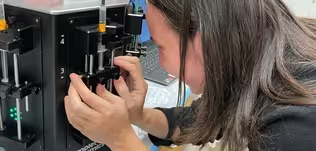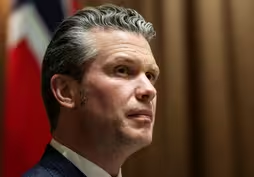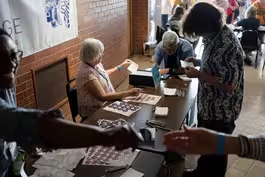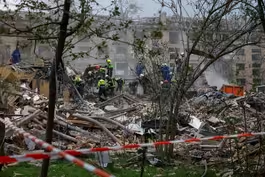
Religious directives complicate care at Catholic hospitals
Clip: 4/24/2025 | 9m 11sVideo has Closed Captions
Religious directives at Catholic hospitals complicate emergency care for pregnant women
For decades, Catholic leaders in the U.S. have placed restrictions on certain reproductive health services at Catholic-run hospitals. But as abortion is becoming harder to access nationwide, there’s a new spotlight on care at these facilities. Special correspondent Sarah Varney traveled to Eureka, California, to meet one woman who ran into the limits of Catholic-run healthcare.
Problems playing video? | Closed Captioning Feedback
Problems playing video? | Closed Captioning Feedback
Major corporate funding for the PBS News Hour is provided by BDO, BNSF, Consumer Cellular, American Cruise Lines, and Raymond James. Funding for the PBS NewsHour Weekend is provided by...

Religious directives complicate care at Catholic hospitals
Clip: 4/24/2025 | 9m 11sVideo has Closed Captions
For decades, Catholic leaders in the U.S. have placed restrictions on certain reproductive health services at Catholic-run hospitals. But as abortion is becoming harder to access nationwide, there’s a new spotlight on care at these facilities. Special correspondent Sarah Varney traveled to Eureka, California, to meet one woman who ran into the limits of Catholic-run healthcare.
Problems playing video? | Closed Captioning Feedback
How to Watch PBS News Hour
PBS News Hour is available to stream on pbs.org and the free PBS App, available on iPhone, Apple TV, Android TV, Android smartphones, Amazon Fire TV, Amazon Fire Tablet, Roku, Samsung Smart TV, and Vizio.
Providing Support for PBS.org
Learn Moreabout PBS online sponsorshipAMNA NAWAZ: For decades, Catholic leaders in the U.S. have placed restrictions on certain reproductive health services at Catholic-run hospitals.
But as abortion is becoming harder to access nationwide, there's a new spotlight on care at these facilities.
Special correspondent Sarah Varney traveled to Eureka, California, to meet one woman who ran headfirst into the limits of Catholic-run health care.
ANNA NUSSLOCK, California Resident: Yes, it was a very fun day.
It was a nice wedding.
SARAH VARNEY: Five hours north of San Francisco, among ancient redwoods and along rainy coastlines, 36-year-old Anna Nusslock and her husband, Daniel, live in the small city of Eureka, California, with their loyal dog and two cats.
ANNA NUSSLOCK: We went out into the woods and we took really sweet pictures with the redwoods.
SARAH VARNEY: The Wisconsin native moved to this rural community a decade ago to begin her career as a chiropractor and to start a family.
ANNA NUSSLOCK: This first one, I started before I was pregnant.
And then I was making the first one.
I couldn't stop imagining a second one.
So I made the second one, and then I found out they were twins.
SARAH VARNEY: Not knowing you had - - were going to have twins, right?
But last February, 15 weeks into her pregnancy, Anna says something felt wrong.
ANNA NUSSLOCK: I started having bleeding and cramping and I went to our hospital, Providence St. Joseph Hospital, and it was a terrible experience.
SARAH VARNEY: Her amniotic sac, where the fetus grows, had ruptured far too early, putting Anna at high risk for infection and uncontrollable bleeding.
Doctors said she needed an abortion right away, but they couldn't help her because an ultrasound was still picking up her daughter's heartbeats.
ANNA NUSSLOCK: I could either wait until somebody's heart stopped, either mine or theirs, or I could leave.
SARAH VARNEY: At what point did it become obvious that this was going to be a very different experience at this Catholic hospital?
ANNA NUSSLOCK: When the doctor told me that my daughters weren't going to survive and then told me that they couldn't do anything because they were a Catholic hospital was the moment that everything kind of came crashing down.
SARAH VARNEY: She was given the option to take a helicopter to San Francisco, which would cost her and her husband $40,000 out of pocket for a 20-minute ambulance ride to a non-Catholic hospital.
Here in California, most people assume they have guaranteed access to abortion care, including when they're experiencing a miscarriage.
That right is guaranteed in the state constitution.
But medical care can get more complicated when Catholic hospitals are involved.
At the center of those complications are the ethical and religious directives, or ERDs.
FATHER CHARLES BOUCHARD, Aquinas Institute of Theology: They started out as kind of a list of do's and don'ts.
SARAH VARNEY: Today's version lays out 77 rules for providing health care in the U.S. Those rules are based on the Catholic Church's theological and moral beliefs, says Father Charles Bouchard, an ethicist and senior fellow at Aquinas Institute of Theology in St. Louis.
FATHER CHARLES BOUCHARD: Everything we try to do, we believe, comes from the Gospels, Jesus' healing and teaching.
SARAH VARNEY: The directives prohibit certain medications and procedures like abortion, sterilization for both men and women, euthanasia, infertility treatment and contraception.
MAN: Good morning, brothers.
SARAH VARNEY: They are written and voted on by the influential U.S. Conference of Catholic bishops, a group of active and retired bishops who set religious policy in America.
But Father Bouchard says it's often up to the local bishop to interpret them.
MAN: This morning, the bishop of the Catholic Diocese of Phoenix made the announcement that St. Joseph's Hospital is no longer considered Catholic.
SARAH VARNEY: If hospitals go against a bishop's wishes, like in 2009, when a Catholic hospital in Phoenix performed an emergency abortion, they can be stripped of their religious affiliation and clergy members excommunicated.
What happens when there's a gray area?
FATHER CHARLES BOUCHARD: In my experience, and I had many calls about these exact situations, it was usually a problem either misunderstanding by the physician or a scrupulous ethicist.
But that normally wasn't the case.
It was usually just that you had a physician who wasn't sure what to do and didn't want to go out on a limb.
LORI FREEDMAN, University of California, San Francisco: If you talk to any doctor in the Catholic hospital, they will tell you they will remember some stories like this.
They will remember stories of suffering or inconvenience where they couldn't provide the standard of care.
SARAH VARNEY: Lori Freedman is a sociologist and bioethicist at the University of California, San Francisco.
Her book "Bishops and Bodies" explores how hospitals navigate these rules and what happens to patient care as a result.
Freedman says doctors at Catholic hospitals frequently get around the directives by concealing treatment or exaggerating symptoms.
LORI FREEDMAN: Doctors would talk about sort of stretching the truth a little, saying, oh, there's tenderness, there's a smell, the fever's rising, sort of giving indications that are close to the truth, but will help them get intervened before it becomes a problem.
SARAH VARNEY: Nationwide, one in six emergency beds are found in Catholic hospitals, and rural areas, like Eureka, are relying increasingly on Catholic health care.
Many rural hospitals are in financial dire straits due to declining populations and falling revenues.
And now only 42 percent of them still have labor and delivery services, leaving Catholic hospitals as the only option for many.
ANNA NUSSLOCK: The sun was just starting to come up over those mountains that way, so it was just a very faint yellow line and starting to brighten.
SARAH VARNEY: After being told she could not get an emergency abortion at the Catholic hospital, Anna Nusslock and her husband, Daniel, drove 20 minutes north to a community hospital.
By the time she was pushed into the operating room, her first twin had delivered on the gurney and Anna was starting to hemorrhage.
Eight months later, that community hospital closed their birth center.
So you have lived in Eureka for about 10 years.
You have had multiple pregnancies, multiple miscarriages.
Were you aware that there were restrictions on the types of reproductive health care you could get?
ANNA NUSSLOCK: I knew that I couldn't get an elective abortion, but I thought I could get emergency care that I needed.
SARAH VARNEY: Lori Freedman says patients like Anna are often surprised that they can't get common reproductive health care, like sterilization after having a baby or birth control pills to treat excessive menstrual bleeding.
That means patients have to rely on doctors to find work-arounds.
LORI FREEDMAN: Work-arounds are not policy.
When you have patients coming to you for care, and the only way they can get the safest care is if you work around the policy, that means that not everybody is going to get the same care.
And I think we know that's where discrimination happens.
SARAH VARNEY: Anna's story is now at the center of a lawsuit brought by California's attorney general against St. Joseph.
Another patient who says she was denied an emergency abortion during a miscarriage is also suing the hospital.
ANNA NUSSLOCK: No religious hospital policy should have sent me away bleeding with a bucket when I needed help.
SARAH VARNEY: During a hearing in February to dismiss California's case, a lawyer for St. Joseph argued providing abortion care violates the hospital's religious freedom and First Amendment rights.
Providence St. Joseph turned down our request for an on-camera interview, but in a statement said it's committed to delivering care in accordance with federal and state law and maintaining its faith-based mission, even if that results in fetal death.
In recent years, the conservative-leaning U.S. Supreme Court has increasingly favored institutions seeking these kinds of religious freedom exemptions.
Since 1986, a federal law has required hospitals to stabilize patients in medical crisis, even if that means ending a pregnancy.
But after the U.S. Supreme Court overturned federal abortion rights, states that banned abortion have argued they shouldn't have to follow the law.
These changes have put a new spotlight on how Catholic hospitals have operated for a long time.
FATHER CHARLES BOUCHARD: I think that we have gotten a bad reputation that was not fully deserved because of some of these women's health care issues.
Now, I don't deny that there have been a lot of problems, but I think the biggest misconception is that we're anti-women.
We have to remember these hospitals were almost all founded by women and largely for women and children.
SARAH VARNEY: One year on, as Anna Nusslock works through the grief of losing her daughters, the fear of nearly losing her own life remains.
How are you feeling about wanting to try and get pregnant again?
ANNA NUSSLOCK: I want to be a mom.
I'm scared because I'm here.
This is where I live.
So I'm trying to make plans to, like, figure something else out, but it's hard.
SARAH VARNEY: Anna says she's channeling that pain into a new purpose.
ANNA NUSSLOCK: Somebody asked me a couple of months ago if I was an activist.
And I said, no, I'm a chiropractor.
And then everybody laughed.
And I was like, why is everybody laughing?
Because I am a chiropractor, but I guess now I have two jobs.
SARAH VARNEY: For "PBS News Hour," I'm Sarah Varney in Eureka, California.
The benefits and toll of rebuilding U.S. aluminum industry
Video has Closed Captions
Clip: 4/24/2025 | 8m 35s | The benefits and financial toll of rebuilding America’s aluminum industry (8m 35s)
Harvard scientist describes ICE detention, deportation fears
Video has Closed Captions
Clip: 4/24/2025 | 7m 12s | Russian-born Harvard researcher describes detention at ICE facility and deportation fears (7m 12s)
Hegseth has unsecured internet in Pentagon office for Signal
Video has Closed Captions
Clip: 4/24/2025 | 4m 37s | Hegseth reportedly has unsecured internet line in Pentagon office for Signal (4m 37s)
How lawmakers are responding to frustrated constituents
Video has Closed Captions
Clip: 4/24/2025 | 5m 18s | How lawmakers are responding to frustrated constituents at town halls (5m 18s)
New FDA commissioner on abortion medication restrictions
Video has Closed Captions
Clip: 4/24/2025 | 2m 1s | What the new FDA commissioner says about possible restrictions on abortion medication (2m 1s)
Russian attacks on Kyiv complicate U.S. peace talks
Video has Closed Captions
Clip: 4/24/2025 | 3m 13s | Russian attacks on Kyiv complicate U.S. efforts to end war in Ukraine (3m 13s)
Utility assistance frozen after Trump fires program's staff
Video has Closed Captions
Clip: 4/24/2025 | 5m 8s | Utility assistance frozen after Trump administration fires program's staff (5m 8s)
Providing Support for PBS.org
Learn Moreabout PBS online sponsorship
- News and Public Affairs

FRONTLINE is investigative journalism that questions, explains and changes our world.

- News and Public Affairs

Amanpour and Company features conversations with leaders and decision makers.












Support for PBS provided by:
Major corporate funding for the PBS News Hour is provided by BDO, BNSF, Consumer Cellular, American Cruise Lines, and Raymond James. Funding for the PBS NewsHour Weekend is provided by...






